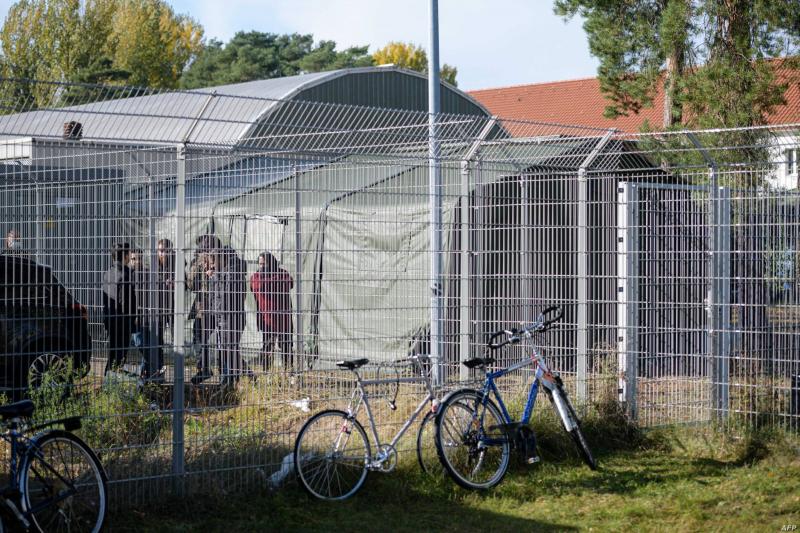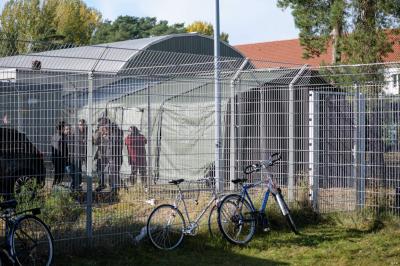Under the title "Caught Between Belarus and Poland: The Struggle of a Syrian Trying to Save His Family," the Al-Hurra website reported that only three kilometers separate the Syrian Raqi Sarour from his family inside Poland, but the journey to reach them is fraught with risks, according to Radio Free Europe. The 25-year-old nurse Sarour was granted asylum in Germany in 2016, and he was welcomed in Poland, unlike his wife, father, sister, brother, uncle, and cousin who fled from Damascus to Belarus on October 20 and crossed into Poland with the help of Belarusian border guards, hoping to eventually reach Germany.
For two weeks, Sarour's family roamed the swamps of Poland near the border with Belarus to avoid detection, spending days without food or water. However, Polish border guards discovered them twice, forcing them to start the arduous journey anew, despite nighttime temperatures dropping to below 15 degrees Celsius. Prolonged exposure in the forest could lead to death, especially since his father is 70 years old. Ten migrants have already died while attempting to cross from Belarus to Poland. Sarour's family is one of tens of thousands impacted, as the migrant crisis along the Poland-Belarus border has become a humanitarian time bomb on the eastern edge of the European Union. The Polish border force recorded over 30,000 attempted crossings since August, including 17,300 in October alone, with German officials stating that about seven thousand of these individuals attempted to enter Germany.
The spike in numbers in recent months coincided with rising tensions between the regime of Belarusian President Alexander Lukashenko and Europe following the forced landing of a commercial flight heading to Lithuania in May, enabling authorities to arrest a dissident journalist aboard. Thousands of asylum seekers have traveled to Belarus in recent months through daily flights from countries such as Yemen, Iraq, Somalia, Afghanistan, and Cameroon. While the vast majority still head towards Poland, many seek entry into neighboring Latvia and Lithuania, as well as other EU member states.
Some see the influx of migrants as a response from Lukashenko to Western sanctions imposed on his government after he claimed a landslide victory in the widely disputed August 2020 elections, followed by a crackdown on opponents and protestors. In response to the increasing flow of migrants, Poland declared a state of emergency along its border with Belarus, deploying ten thousand soldiers to the area to prevent migrants from crossing into its territory, while the parliament approved a budget to construct a border wall in the coming weeks.
The Polish government's stance on keeping migrants out has received strong support from the far-right and violent backlash from liberals. Protesters marched in Warsaw and other cities chanting, "Stop the torture at the border." While locals in Hajnówka and other towns near the border undergo regular police checks during routine trips to work or the grocery store, many activists risk arrest simply for wanting to help, viewing their government’s measures as lacking a moral compass. Radio Free Europe narrates the story of a hotel waitress scouting local roads for police checkpoints before activists move out of the forest, and a taxi driver who transports arriving migrants into town, potentially facing hefty fines and a criminal record if caught, alongside many other volunteers providing food and clothing to migrants. Activists assisting migrants criticize what they describe as their government's stubbornness and argue that Poland, a high-income country with a population of 38 million, can easily accommodate 30 thousand refugees.
Many migrants report paying several thousand dollars to travel agencies linked to Belarusian authorities that facilitate visas, travel, and short stays in hotels in Minsk before transporting them to the Polish border. The report states that Belarusian officials cut barbed wire at night to allow selected groups of migrants to pass. Once they reach Polish territory, they are either intercepted by Polish border forces and returned across the border— a practice banned under international law but approved by the Polish parliament last month— or they wander in the woods until they receive a signal from a smuggler to quickly move towards a waiting vehicle to take them across the border.
Many migrants who have been caught and returned to Belarus report being beaten by Belarusian border guards and coerced back to Poland, often spending days in the desolate strip of no man's land between the two countries, while some pay hefty bribes to be returned to Minsk, either to start the journey all over again or to surrender and return to their countries of origin. Karrar, an Iraqi Kurd traveling with his pregnant wife, spent four nights in the swamp and ten days without water, according to the report, indicating that he spent six thousand dollars reaching Poland but was turned back by border guards seven times, stating, "They treat us like animals." As for Sarour, he has managed to send supplies to his family himself on two occasions. Each time, the entire group wept and embraced him as he made promises he was unsure he could keep. Like hundreds of other migrants who traveled to Belarus on October 20 in search of a better life, Sarour and his family imagined that the journey to Germany would be relatively easy, encouraged by optimistic posts on social media in Arabic.
He and his wife Safaa first met as teenage colleagues in Daraa, and they hoped to hold a formal wedding ceremony upon their arrival in Germany in October, attended by Sarour's relatives and his German host family. On November 4, he said, "Everything was different in my imagination, and now both of us are suffering, even though there is only a two-mile distance between us, and we can barely see each other. It is impossible to describe this in words."




